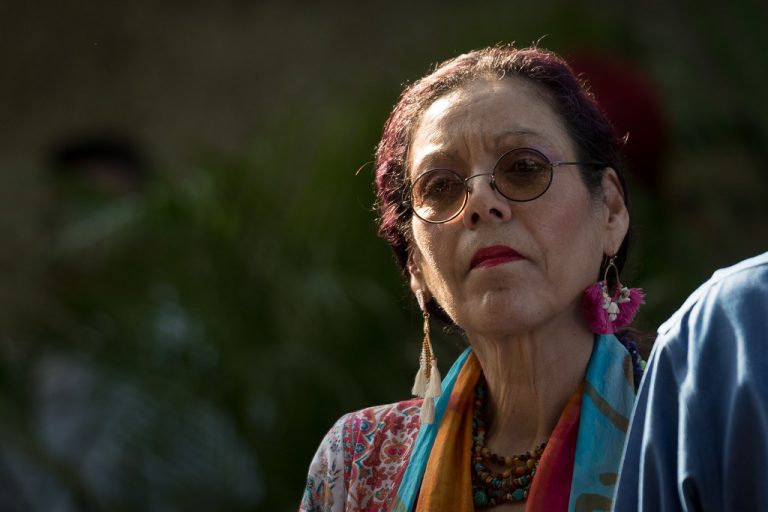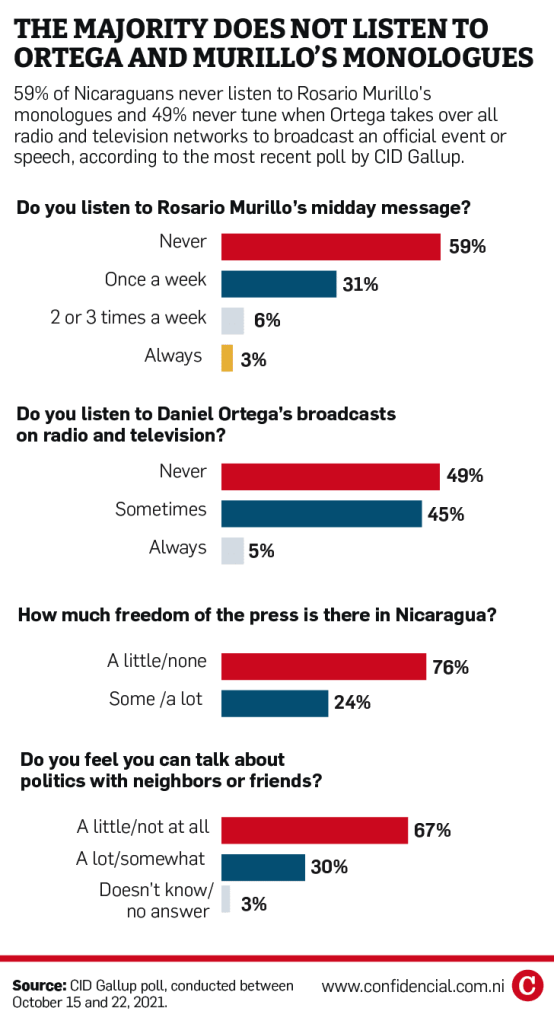4 de noviembre 2021

Children of Exile: The Births “Sowing Hope” in the Camp of Nicaraguan Farmers

PUBLICIDAD 1M
PUBLICIDAD 4D
PUBLICIDAD 5D
A total of 79% believe there is no freedom of expression in Nicaragua and 76% think there is “little or no” freedom of the press

Ortega calls them “children of the devil”. Murillo adds: “sellouts
59% of Nicaraguans never listen to the monologue that Daniel Ortega's wife, vice-president and spokesperson of the regime, Rosario Murillo, broadcasts from Monday to Friday at noon, through the “Citizen Power” official media, according to the results of the most recent survey conducted by the Costa Rican firm CID Gallup.
Of those consulted 31% responded that they listen to Murillo's message once a week; 6% said twice or three times a week, and only 3% answered that they always listen to it.
Murillo controls the Ortega regime’s policy of “uncontaminated communication”, in which no official gives statements without her approval. Reports from the Ministry of Health on the covid-19 pandemic, announcements of visits and projects, calls for official acts and supporters are all part of her daily talks. Likewise, reports on hurricanes, tremors and earthquakes, and her diatribes are loaded with epithets against any sector or person who opposes or criticizes the regime, mixed in with verses, prayers and patron saint festivals.
When the polling firm asked: “Do you listen to Daniel Ortega’s nationally broadcast speeches on radio and television?”49% of those consulted answered never, 45% said they sometimes tune in and 5% said they always do.
Through the Institute of Telecommunications and Post (Telcor), the Nicaraguan Government orders the operators of national television stations and radio services to connect to the events featuring Daniel Ortega each time he reappears in public, requiring them to rebroadcast those appearances.

In July of this year, Telcor approved a regulation in which “stations are obliged to join the radio and television chain” convened due to “national and regional emergency situations, linked to the security and defense of the nation.” This is also the case when dealing with “serious alterations to public order, economic and social conditions, epidemics, pandemics, phenomena or natural catastrophes and in general when the Nicaraguan government authorities transmit messages of national interest.”
As of that date, all of Ortega's public appearances are broadcast on the national network. In addition, cable television service operators are obliged “to broadcast them in full throughout their entire channel grid, without cuts, alterations or modifications of any kind”, at the time and date indicated by Telcor.
The CID Gallup poll, contracted by CONFIDENCIAL, was conducted between October 15 and 22 nationwide with a sample of 1,019 people over 16 years of age through cell phone interviews. The same number of men and women were consulted, and it has a margin of error of +/- 3.1%.
Of those surveyed 34% were between 25 and 34 years old, 23% between 35 and 44, and 20% between 16 and 24. In addition, 15% of those consulted were between 45 and 54 years old and the remaining 7% over 55.
Regarding the level of education, 45% of the interviewees had studies up to primary school, 44% high school and 11% had higher studies.
The polling firm also consulted Nicaraguans about how much freedom of expression there is in Nicaragua and 79% said “little or none”. Only 21% believe there is “a lot or some”.
When asked about how much freedom of the press there is in the country, 76% answered “little or none”, while 24% believe that there is “a lot or some”.
In July of this year, the international organization Reporters Without Borders (RSF) ranked the Nicaraguan president as one of the 37 “predators of press freedom” in the world, on its 2021 list of heads of state that "impose a massive repression against freedom of the press."
The organization pointed out that, since 2016, independent media and journalists “live a true nightmare, under the constant repression by the Ortega government and its supporters of the Sandinista National Liberation Front, who are trying to silence critical voices.”
The CID Gallup study also reveals that, when asked if they feel as though they can talk to neighbors or friends about politics, 67% of Nicaraguans responded “a little or not at all”. Thirty percent said they could talk about these issues “a lot or somewhat” and 3% had no opinion or did not want to answer that question.
Of the people interviewed, women (73%) were the ones who showed the least willingness to talk about politics, while 61% of men expressed their fear of referring to these issues even among neighbors and friends.
This article was originally published in Spanish in Confidencial and translated by Havana Times
Archivado como:
PUBLICIDAD 3M
Confidencial es un diario digital nicaragüense, de formato multimedia, fundado por Carlos F. Chamorro en junio de 1996. Inició como un semanario impreso y hoy es un medio de referencia regional con información, análisis, entrevistas, perfiles, reportajes e investigaciones sobre Nicaragua, informando desde el exilio por la persecución política de la dictadura de Daniel Ortega y Rosario Murillo.
PUBLICIDAD 3D